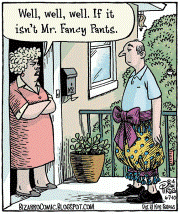|
Home
|
Sep 21, 2020
This week’s themeShirts & pants This week’s words fancy-pants shirtsleeve trouser role brownshirt seat-of-the-pants 
Cartoon: Dan Piraro Previous week’s theme Words that aren’t what they appear to be A.Word.A.Day
with Anu GargIf you had to choose, would you rather be shirty or blousy? I’m not talking about your clothing preferences for your upper body. Whichever way you go, it’s not looking good. To be shirty is to be bad-tempered or irritable and to be blousy is to be disheveled. Though, to be clear, the word blousy has nothing to do with the blouse (it’s from a dialectal word blowze, meaning wench). The English language has many idioms involving clothing. To keep one’s shirt on is to refrain from losing one’s temper, while to lose one’s shirt is to lose everything. Language is not always logical. How about pants? To wear the pants in a relationship is to be the dominant partner. To catch someone with their pants down is to catch them in an embarrassing or unprepared state. This week we’ll see five terms related to pants and shirts. Whatever you choose to wear (or not wear), keep your mask on. fancy-pants
PRONUNCIATION:
MEANING:
noun: Someone attractive, silly, or pretentious. adjective: Snobbish; pretentious; newfangled; overly complicated. ETYMOLOGY:
From fancy, a contraction of fantasy, from Old French fantasie, from Latin
phantasia, from Greek phantasia (imagination, appearance), from phantazein
(to make visible) + pants, short for pantaloons, plural of pantaloon. St.
Pantaleone/Pantalone was a popular saint in Venice. As a result, it was
also a common name among the Venetians. As a result, a comic character in
the Italian commedia dell’arte was named Pantalone. The leggings this
character wore became known as pantalone (plural pantaloni). And that
became pantaloons in English. Earliest documented use: 1870. A related
word is smarty-pants.
USAGE:
“Let’s concentrate on the ones that make it, not waste space on some damn
fancy-pants New Yorker who wants to make a big splash by dragging her
old ideas to a new location.” Lucy Burdette; Death with All the Trimmings; Obsidian; 2014. “Well, it’s not as accurate as DNA testing, but hey, it’s what they used to use before all these fancy-pants tests.” B.J. Daniels; A Woman with a Mystery; Harlequin; 2001. A THOUGHT FOR TODAY:
Good books don't give up all their secrets at once. -Stephen King, novelist
(b. 21 Sep 1947)
|
|
Subscriber Services
Awards | Stats | Links | Privacy Policy
Contribute | Advertise
Awards | Stats | Links | Privacy Policy
Contribute | Advertise
© 1994-2024 Wordsmith